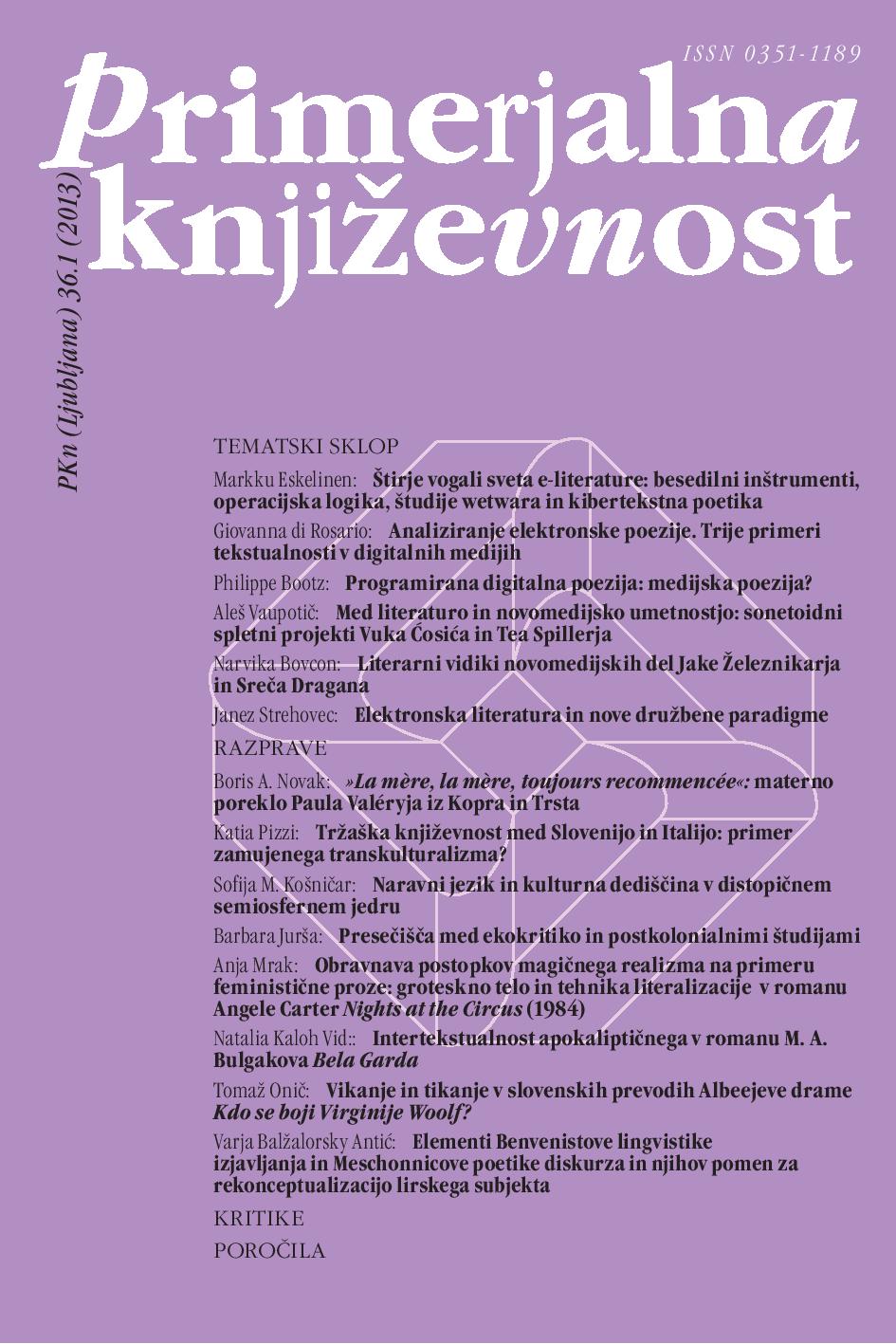The Intertextuality of the Apocalyptic in Mikhail Bulgakov’s White Guard
Keywords:
English drama, Slovenian translations, Albee, Edward, dramatic style, formal form of address, familiar form of addressAbstract
The article is an analysis of apocalyptic context in Mikhail Bulgakov’s first novel The White Guard, which depicts the period of the Civil War in 1918–1919 in Ukraine and follows the destiny of one family in the chaotic time of war, destruction, and downfall of the old regime. The White Guard, free from typical soviet ideological constraints, was strongly criticized by Soviet critics and was never published as a whole in Bulgakov’s lifetime. In The White Guard Bulgakov uses numerous intertextual figures to refer to biblical texts, above all to The Book of Revelation, one of his most important sources. My analysis shows prevailing intertextual figures, explains their functions, and highlights the context in which they appear. I will clarify that Bulgakov uses intertextuality as one of the key elements of his literary style. All figures, quotes, allusions and stylizations are unified and have important functions in the construction of Bulgakov’s literary world. My analysis shows that Bulgakov’s mythological view of history differs from the traditional Christian one. Bulgakov views history as cyclical, which suggests to him the recurrence and convergence of images, so that they become multiplied and enriched. In The White Guard, images and symbols are introduced which reappear in Bulgakov’s later fiction and dramas, such as the apocalyptic beast, apocalyptic horse-riders, snowstorm and the red star from Revelation. For a mythological vision, the idea of revival is essential. Similarly, for Bulgakov the end of the world may come many times and the end of one cycle always means the beginning of another. Bulgakov sees the history of Russia as an endless cycle of apocalyptic catastrophes brought about by wars. However, each ending brings new hope that people will learn the lesson of history and that the next cycle might be different. The eschatological and apocalyptic atmosphere of Bulgakov’s works was reflected in his own experience. Born in 1891, Bulgakov witnessed the horrors of the Bolshevik revolution and Russian Civil War in Russia, which he comprehended as a realization of apocalyptic prophecy.References
Berdjajev, Nikolaj. Russkaja ideja. Sankt-Peterburg: Azbuka-klassika, 2008.
Bulgakov, Mikhail. Bela garda. Prev. Marjan Poljanc. Ljubljana: Mladinska knjiga, 1975.
– – –. Dnevnik. Pisjma. 1914–1940. Moskva: Sovremennyj pisatelj, 1997.
Gasparov, Boris. Novyj zavet v proizvedenijah M. A. Bulgakova. Мoskva: Literaturnye motivy, 1994.
Himič, Vera. V mire Mihaila Bulgakova. Jekaterinburg: Uraljskij universitet, 2003.
Hodasevič, Vjačeslav. »Smysl i sudjba Beloj gvardii«. Literaturnoje obozrenije 5 (1991): 43–45.
Jablokov, Jevegenij. »Lico bremeni za steklom večnosti. Istoriosofija Mihaila Bulgakova«. Obščestvennye nauki 3 (1992): 97–108.
Javornik, Miha. Evangelij Bulgakova: (o ustvarjalnosti Mihaila Afanasjeviča Bulgakova). Ljubljana: Znanstveni inštitut Filozofske fakultete, 1994.
Karjakin, Jurij. »Dostojevskij in Apokalipsis«. Uvodna beseda. Dostojevskij F. M. Sobranije sochinenij v 7 tomah. T 1. Moskva: Lexicon, 1996. 5–15.
Meletinskij, Evgenij. Poetika mifa. Мoskva: Nauka, 1976.
Petrovskij, Miron. Мaster i gorod. Kijevskije konteksty M. Bulgakova. Kijev: Duh i Litera, 2001.
Skaza, Aleksander. »Fragment o dramatiki Mihaila Bulgakova«. Jezik in slovstvo 6 (1979/80): 155–159.
Sveto pismo Stare in Nove zaveze. Razodetje (Apokalipsa). Svetopisemska družba Slovenije: Ljubljana, 2005. 276–297.
Varlamov, Аleksej. Mihail Bulgakov. Moskva: Molodja gvardija, 2008.


